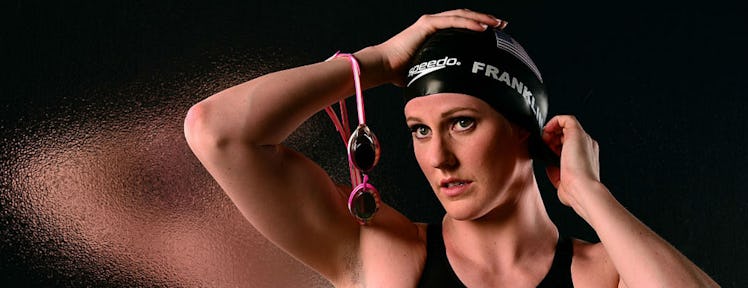Missy Franklin’s Father On Raising An Olympic Champ Without Screaming At Coaches, Refs, Or Kids
Everything went swimmingly.

As you and the kids settle in for your biennial Olympic binge-watching marathon, at some point you’ll probably wonder: “My kid can bounce on a trampoline. How do I raise an Olympic trampolinist?” Dick Franklin can’t help you with that, but he has a few ideas about to raising Olympic swimmers — really, really good ones, too.
Franklin’s daughter Missy was a breakout star of the 2012 Olympics in London, winning 4 golds and a bronze as a 17-year-old Olympic rookie. In the 4 years since, she’s endured her first major injury, a complicated move from amateur to professional status, and the shocking failure to re-qualify for one of her gold medal events, the 100m backstroke, at the Olympic trials. Still, she qualified for 3 others and arrives in Rio a gold medal favorite in each, which is a testament to her grit and determination. And that’s a testament to her dad, a former professional football player in the CFL, who’s been with her every step … er … stroke of the way.
Even if your own kid didn’t win the genetic lottery (no offense, it’s just that, at 6’2”, with size 13 feet, Missy has been described as “half dolphin”), Dick has some basic best practices that any parent of an athletically gifted kid would do well to follow. You can read all about them in the book he and Missy wrote about it, but since that doesn’t come out until December, here are a few highlights.
Pay Attention Early And Don’t Push It
Dick put Missy in a pool when she was 6 months old and something peculiar happened: “She showed no fear. She opened her eyes under the water and was ecstatic. As parents, it’s about being mindful and picking up those cues that children involuntarily give you. You can tell when children are forcing themselves in different activities and endeavors in life. Encourage what they love.”
Facebook / Missy Franklin
Define Success Carefully
When your kid’s winning streak starts at 5 years old and goes nearly unbroken until her first Olympics, it’s easy to invest in first place ribbons, but Dick managed to invest in perspective instead. “If she left it all in the pool and tried her best, whether she won or came in first, second, or third, if she knocked a half-second off her previous time — that was a really good job. That’s what we encourage every time: Improvement.”
Remind Them To Acknowledge Their Accomplishments
When your kid is the kind of athlete who can legitimately put “Being The Best Ever” on their career goals list, it’s easy for them to lose sight of goals they they have to achieve to get there — goals that, in and of themselves, would represent the pinnacle for 99 percent of mere mortals. Before the 2012 Games, Dick recalls saying to Missy, “‘Honey, you’re a U.S. Olympian. Nobody will ever take that away from you.’ If everything stopped there, it would have been fabulous.”
Leave The Swimming In The Pool
Or the soccer on the field, or the ping pong on the table … you get the gist. “Swimming is already 80 percent of her existence,” Dick says about his daughter. “I’m a football player, and I’m continually impressed with the time and effort these kids put in the pool. It far outweighs any other sport that I know. They train 4-to-6 hours a day, 11 months of the year. But there’s more to life than touching the wall first. [When we’re at home] we just have quiet times together and don’t discuss a lot about swimming.”
“There’s more to life than touching the wall first. [When we’re at home] we just have quiet times together and don’t discuss a lot about swimming.”
Don’t Let Pressure Trump Perspective
At this year’s Olympic Trials, Missy’s status as one of the biggest names in swimming was hard to miss. Her new professional status allowed her to sign a deal with one of the sport’s largest brands, Speedo, and they carpet bombed the event with a campaign focused on her. So, a 7th-place finish in her first event risked putting a very negative vibe on what was still an on-going qualifying campaign.
“Every Olympics is different,” says Dick. “Sure, she would have liked to have got back in the 100m backstroke again, but it wasn’t to be. That’s sports, there are ups and downs. I said to her, ‘Two-time Olympian. That’s pretty extraordinary in this day and age, and qualifying for 3 events? That’s extraordinary as well.’ Look at all the Olympians she’s known and worked with over the last 4 years who didn’t make it at all. There are people who aren’t going to Rio, period.”
Spectate Like You’ve Been There Before
When Missy hits the water for her first event in Rio, Dick will be easy to spot — he’s the guy who’s not losing his mind. “I’m not a bundle of nerves. This is sports, you go, you enjoy it,” he says.
That’s what separates the Olympic parents from the Junior Olympic parents: “At the high school level and younger, the parents are less experienced, more egotistical, and less worldly. Often, that’s the way they deal with the child or the way they deal with the coach. The parents of athletes at the Olympic level are extremely constructive, reinforcing, and positive. From the Ledeckys to the Phelps — all of them are classy people. They conduct themselves and represent their country and their daughters and sons in unbelievable ways.”
Dick and Missy Franklin’s book Relentless Spirit: The Unconventional Raising Of A Champion is available for pre-order now.
This article was originally published on